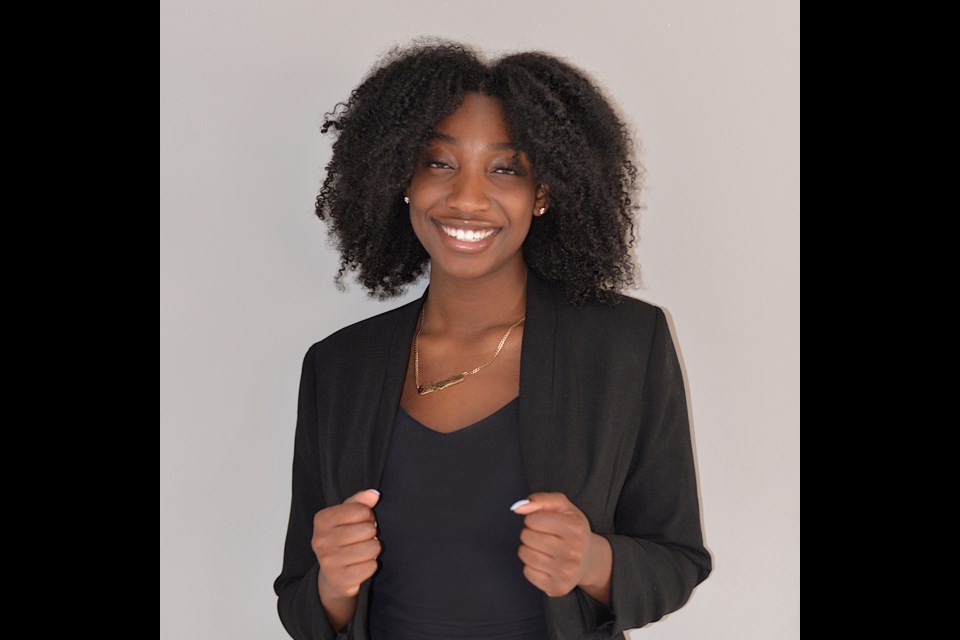Bradford teen Schymera Samuels is headed to Queen's University this fall, as part of the prestigious QuARMS (Queen's Accelerated Route to Medical School) program.
The fast track program will allow her into medical school without having to take the MCAT (Medical College Admission Test).
Samuels is a Grade 12 student at Crestwood Preparatory College in Toronto. She has been attending the school since Grade 8 on a full scholarship after being scouted at an Ontario Basketball Association competition.
From a young age, she enjoyed playing basketball which caught the attention of scouts from the Toronto school, known for its varsity sports.
And while she hasn't been playing that much now due to COVID restrictions, she has had the year to focus on her studies and post-secondary education plans.
While researching which schools to apply to, she came across the pathway program at Queen's. The program is one of a kind in the country, open exclusively to Black-identified and Indigenous students.
In 1918, Black people were banned from the medical programs offered at Queen's University. Other big-name schools like McGill, Dalhousie, and the University of Toronto had similar restrictions on admission for Black students.
It wasn't until 1965 that Black students were able to enroll in the medical programs at Queen's University again, but the ban wasn't officially repealed until 2018, with the university senate issuing a formal apology in April 2019. The history of the ban is now taught at the school to first-year medical students.
A statement from Dr. Jane Philpott, Dean, Queen’s Faculty of Health Sciences on the Queen's website reads,
"Queen’s recognizes that Indigenous peoples and Black Canadians have been historically underrepresented in the medical profession, and that standard medical admissions practices have imposed barriers to these groups. With this new approach to the QuARMS pathway, we are hoping to reach individuals who may not have considered Queen’s or the medical profession otherwise. Our faculty aims to become a leader in Canada in cultural safety, anti-racism, anti-colonialism, and anti-oppression in health professions education. There is a large body of work to be done and this is one important step toward making a Queen’s health professions education more accessible."
As a Black girl, Samuels is proud to be one of the 10 students accepted into the program and hopes to raise awareness about the lack of diversity in the medical field and the health issues affecting the Black community, in particular cardiovascular diseases.
"I just think diversifying the positions in Canada, and all over the world, will allow for better treatment and will put an end to poverty cycles between minorities," she said. "I am honoured to be part of the solution."
Currently only 2.7 percent of physicians in Canada are Black, and Samuels wants to see that number increase in the future.
"I aspire to not only make a strong impact within the Black community but to also dramatically increase the percentage of Black physicians," she said.
To be accepted into the program, Samuels went through an intense application process that included panel interviews and, Q&As, and written tests.
"I thought it'd be a great opportunity, but getting this position would be like winning the lottery," she originally thought.
So when she received her acceptance letter, she was ecstatic.
"It's almost like it's a dream," says proud mother, Angela Samuels.
Samuels is looking forward to starting university and having the opportunity to accelerate her career in the medical field. The program is two years long and requires students to maintain a 3.5 GPA and will include a mix of hands-on and theoretical work.
Her interest in health sciences started after her uncle passed away from a blood clot when she was just eight years old.
"I just wanted answers, I just wanted to know why (it happened) so that's where my passion grew," she said. "I fell in love with understanding why things happen, and how we can prevent it."
In high school, she would stay late after class, to learn more about science and take on extra assignments.
"I just love the investigation," she says about the field.
She hopes to one day become a cardiothoracic surgeon, a surgeon who deals with trauma to the heart and diseases in the thoracic cavity.
"I am just so captivated by the heart and the circulatory system, there's something about it that just interests me and this is something I want to know more about," she said.
Like all other students in the province, she is currently learning online which she says it's been a positive experience so far. Prior to COVID, her commute to school would be two and a half hours each way, so she is grateful for the extra time to study and sleep.
From balancing basketball and schoolwork, Samuels says her experiences over the past five years have helped her prepare for the next chapter of her life as a university student.
She has lived in Bradford for the past two years, after moving north from Vaughan. She loves Bradford's small-town feel and has made a lot of friends.
"It's a pleasure being here," she said.
When she's not studying, she says she loves to paint as a way to de-stress.
"Sometimes I just paint out my emotions, paint out what I'm feeling," she said. "It relaxes me...painting with music on allows me to let go."
Samuels wants other young Black and Indigenous people to know this opportunity exists for those interested in studying medicine.
"There is a doorway open for them to bring in culture (to medicine)," reminds Angela. "Culture is very important in medicine, every culture experiences different disparities and medical conditions differently."
"You don't have to be at the top school in Canada or in an Ivy program to be what you want to be," added Samuels.
Samules hopes her story will help motivate others to work toward future goals, embracing all the opportunities available to them.
